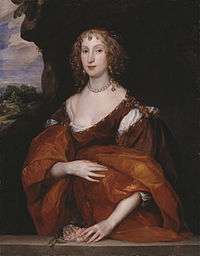William Killigrew (1606–1695)


Sir William Killigrew (1606–1695) of Kempton Park,[1] Middlesex, was an English court official under Charles I and Charles II.[2]
He was the son of Sir Robert Killigrew (d. 1633/5) and Mary Woodhouse, of Kimberley, Norfolk, his wife. He was the elder brother to Thomas Killigrew. He married Mary Hill and they had seven children, of whom only sons Robert and William survived their father.
Killigrew was knighted in May 1626. He was elected MP for Newport and Penryn, Cornwall in March 1628, but only sat for the latter. In 1629, he and his father were jointly awarded the Governorship of Pendennis Castle. However, after some trouble, he resigned in favour of Sir Nicholas Slanning[3] in April 1635.
In 1634, he granted a 99-year lease of 6 shares of land (150 acres (61 ha)) in Hamilton Tribe of Bermuda to his uncle, Henry Woodhouse, former governor of Bermuda. The rent was nominal - 100 oranges, 100 lemons and 100 potatoes, payable at the Feast of the Annunciation of the Blessed Virgin Mary - but Woodhouse did not keep up the payments. In 1637, Killigrew reclaimed the land.[4] With partners, he attempted to drain the Lincolnshire fens, an immensely expensive undertaking. During the English Civil War he gave loyal and effective support to the King.
In 1646 he presented himself to the directors of the Levant Company and insisted that he was the king's choice as ambassador to Constantinople. His candidacy was not considered.[5]
At the Restoration he was made the Queen's Vice-Chamberlain, an influential and well-rewarded post.
From 1664 to 1679 he was Member of Parliament for Richmond in Yorkshire.
He was the author of four plays of some merit.[6] The four dramas, with their dates of publication, are:
- Ormasdes, or Love and Friendship (1664)
- Pandora, or the Converts (1664)
- Selindra (1664)
- The Siege of Urbin (1666).
The tragicomedy The Siege of Urbin has often been considered his best play. Poet Edmund Waller addressed verses to Killigrew on the subject of Pandora, which indicate that the play was originally a tragedy; Killigrew revised it into a comedy after the tragic version failed onstage.[7]
References
![]() This article incorporates text from a publication now in the public domain: Chisholm, Hugh, ed. (1911). "article name needed". Encyclopædia Britannica (11th ed.). Cambridge University Press.
This article incorporates text from a publication now in the public domain: Chisholm, Hugh, ed. (1911). "article name needed". Encyclopædia Britannica (11th ed.). Cambridge University Press.
- ↑ History of Parliament biography KILLIGREW, Sir William II (1606-1695), of Pendennis Castle, Cornw.; later of Lincoln's Inn Fields, London and Kempton Park, Mdx.
- ↑ ODNB article by J. P. Vander Motten, ‘Killigrew, Sir William (bap. 1606, d. 1695)’, Oxford Dictionary of National Biography, Oxford University Press, 2004 , accessed 9 September 2007
- ↑ Sir Nicholas Slanning (1606–43), English Civil War hero. Not to be confused with his son of the same name, who was MP for Penryn 1679-89.
- ↑ College Quarterly (1976-06-01). Genealogies of Virginia Families from the William and Mary College Quarterly. Genealogical Publishing Com. p. 520. ISBN 978-0-8063-0955-2. Retrieved 2012-09-13.
- ↑ Daniel Goffman, Britons in the Ottoman Empire, 1642-1660 (Seattle & London, 1998), p. 90.
- ↑ "some merit": this is the judgement of the 1911 edition of Britannica. ODNB assigns them "limited literary value", but great historical interest.
- ↑ James Orchard Halliwell-Phillipps and David Erskine Baker, A Dictionary of Old English Plays, London, J. R. Smith, 1860; p. 188.